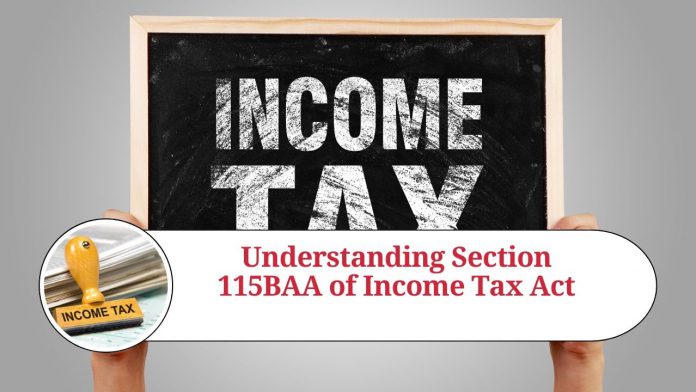Section 115BAA of the Income Tax Act, 1961, was introduced in the Union Budget 2019 with an aim to provide relief to domestic companies. This section allows domestic companies to opt for a lower tax rate of 22% (as against the earlier tax rate of 30%) provided they forego certain deductions and exemptions. In this blog, we will discuss the key provisions of Section 115BAA and how it impacts domestic companies.
Eligibility criteria for Section 115BAA
To be eligible to opt for the lower tax rate under Section 115BAA, a domestic company must satisfy the following conditions:
- The company must be incorporated in India and should not have been registered under the Companies Act, 2013 before 1 April 2016.
- The company must not have claimed any deduction under Section 10AA, 32(1)(iia), 32AD, 33AB, 33ABA, or 35(1)(ii)/(iia)/(iii)/(iiia)/(iv)/(iva) in any previous year.
- The company must not have claimed any set-off of any loss carried forward from any earlier assessment year if such loss is attributable to the deductions mentioned in point 2 above.
If a domestic company satisfies all the above conditions, it can opt for the lower tax rate under Section 115BAA for any assessment year after 2019-20.
Benefits of Section 115BAA
The key benefit of Section 115BAA is that it offers a lower tax rate to domestic companies, which can lead to significant tax savings. Previously, domestic companies were taxed at a rate of 30%, but with the introduction of Section 115BAA, they can now opt for a lower tax rate of 22%. This reduction in the tax rate is aimed at boosting the investment and growth of domestic companies, thereby spurring economic growth.
However, it is important to note that companies opting for the lower tax rate under Section 115BAA will not be eligible for certain deductions and exemptions. These include deductions under Section 10AA (special economic zones), 32(1)(iia) (additional depreciation), 32AD (investment in new plant and machinery), 33AB (tea development account), 33ABA (site restoration fund), and 35(1)(ii)/(iia)/(iii)/(iiia)/(iv)/(iva) (certain scientific research expenses). Therefore, companies need to weigh the benefits of the lower tax rate against the foregone deductions and exemptions before opting for Section 115BAA.
In conclusion
Section 115BAA of the Income Tax Act, 1961, provides domestic companies with the option of a lower tax rate of 22% provided they forego certain deductions and exemptions. This provision is aimed at boosting the investment and growth of domestic companies, thereby spurring economic growth. However, companies need to carefully consider the impact of foregone deductions and exemptions before opting for Section 115BAA.
Read more useful content:
- section 234e of income tax act
- section 286 of income tax act
- section 90a of income tax act
- section 40a(7) of income tax act
- section 226(3) of income tax act
- section 24 of income tax act
Frequently Asked Questions (FAQs)
Q. What is Section 115BAA of the Income Tax Act?
Section 115BAA of the Income Tax Act is a provision that allows domestic companies to opt for a lower tax rate of 22% (as against the earlier tax rate of 30%) provided they forego certain deductions and exemptions.
Q. Who is eligible to opt for Section 115BAA?
Domestic companies that satisfy the following conditions are eligible to opt for the lower tax rate under Section 115BAA:
The company must be incorporated in India and should not have been registered under the Companies Act, 2013 before 1 April 2016.
The company must not have claimed any deduction under certain sections of the Income Tax Act in any previous year.
The company must not have claimed any set-off of any loss carried forward from any earlier assessment year if such loss is attributable to the deductions mentioned above.
Q. What is the tax rate applicable under Section 115BAA?
The tax rate applicable under Section 115BAA is 22%.
Q. What deductions and exemptions are foregone under Section 115BAA?
Companies opting for the lower tax rate under Section 115BAA will not be eligible for certain deductions and exemptions, including deductions under Section 10AA, 32(1)(iia), 32AD, 33AB, 33ABA, or 35(1)(ii)/(iia)/(iii)/(iiia)/(iv)/(iva) of the Income Tax Act.
Q. Can a company opt for Section 115BAA in any assessment year?
Companies can opt for Section 115BAA for any assessment year after 2019-20.
Q. What is the objective of Section 115BAA?
The objective of Section 115BAA is to provide relief to domestic companies by offering a lower tax rate and encouraging investment and growth.




















